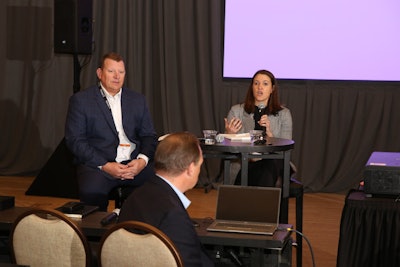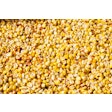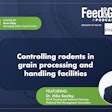
Labor and access to a workforce is one of the most pressing issues around the country, whether on a farm, a downstream pack and processing plant or anywhere throughout the entire food chain and ag sector. With a labor shortage everywhere and a lack of mobile domestic workers, where do employers turn?
The National Grain and Feed Association’s Country Elevator Conference took on the topic of hiring foreign nationals in the grain and feed industries with the concurrent session Help Wanted: Foreign Ag Labor Solutions, featuring Kristi Boswell, agricultural policy lawyer with Alston & Bird, and Shawn Lambert, Co-Alliance Cooperative, Inc.’s senior director of safety. Boswell provided legal counsel for Co-Alliance to hire South African workers to fill jobs at the Indianapolis-based cooperative using the H-2A Temporary Agricultural Workers program.
The H-2A Temporary Agricultural Workers program allows U.S. employers or U.S. agents who meet specific regulatory requirements to bring foreign nationals to the United States to fill temporary agricultural jobs.
In 2023, about 370,000 H2A certificates will be used for agriculture labor. The work they perform must be temporary, seasonal and agricultural in need, such as crop harvesting, pruning, delivering goods and agronomy.
Boswell said the keyword is temporary. “Milking cows, for example, is not something you can use the H-2A program for because cows need to be milked all year long,” Boswell noted.
There are several agencies involved in approving applications for H-2A workers, including the State, the Department of Labor (DOL) and the Department of Homeland Security (DHS). The application process required identity verification and background checks and is a paperwork-intensive process. Lambert highly recommended hiring a lawyer to ensure the paperwork and necessary documentation are provided.
Boswell said it takes about six months to complete this process, so it is important to begin in the early part of the year if an agricultural cooperative plans to hire foreign nationals for harvest-related work.
While the application is being processed, companies must continue actively recruiting American workers. The program is not meant to replace jobs for American workers, but rather support American companies that cannot find domestic labor.
Foreign workers must be paid the same wage as American workers for the same work, and the employer must provide housing and transportation to work. Lambert said despite the arduous H-2A application process and the additional costs, hiring laborers using the H-2A program is well worth it for Co-Alliance.
In 2019, Co-Alliance hired 17 South Africans who primarily worked in our agronomy.
“We had incredible success with them,” Lambert said. “We had zero performance issues, zero disciplinary issues — they were great people and model employees.”
Unemployment in South Africa is about 40%, Lambert said, and Co-Alliance, Inc. gives people living in challenging circumstances an opportunity to work and support their families. In 2023 they increased the number of hires to 56 and the Co-op was preparing their 2024 H-2A application in December 2023.
“We’re hiring 46 returning workers from the 56 hired last year,” Lambert said. “Two of them have decided to stay home and the eight others are going to work for local farmers.”
To learn more about the H-2A program and how it could benefit your company, Farmers.gov has an interactive H-2A portal that outlines the timeline and necessary documents required before you begin the process of hiring foreign labor.
NGFA’s 52nd annual Country Elevator Conference and Trade Show was held December 3-5 in Louisville, Kentucky. The meeting attracts several hundred industry members, including grain merchants, elevator operators, feed manufacturers, processors, and grain industry suppliers, for networking and education.
Kristi Boswell is counsel in the Legislative & Public Policy Group and a member of the Food, Beverage & Agribusiness Team. Boswell is a preeminent agricultural labor and immigration policy advisor and was instrumental in streamlining long standing agriculture labor regulatory reforms in the H-2A visa program and drafting immigration legislation. She was active in implementation of the 2018 Farm Bill and orchestrated the development of COVID-19 and trade mitigation assistance under Commodity Credit Corporation authorities. She has also worked with the Department of Labor, Department of Homeland Security, State Department, Food & Drug Administration, and Congressional committees.
Shawn Lambert is the Senior Director of Safety for Co-Alliance Cooperative, Inc., based in Indianapolis, Indiana. The farmer-owned cooperative is nearly 100 years old and delivers solutions in agronomy, propane, fuels, grain, seed, swine production, and feed, offering a diverse portfolio of products and services.



















